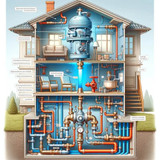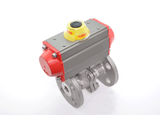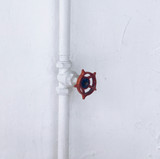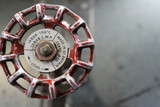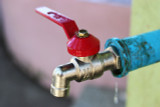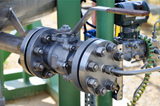2-Way Ball Valves
Two-way ball valves are the workhorses of fluid control systems. These nifty devices are all about managing flow in one direction, and they're everywhere, from oil rigs to water treatment plants. At ValveMan, we have a solid lineup of 2-way ball valves that'll do the job without fuss.
Our valves are built tough to handle anything—high pressure, extreme temperatures, you name it. Whether you're working on a DIY project in your garage or kitting out a massive industrial plant, our two-way ball valves have got you covered.
We know these valves are crucial to running your operations smoothly, so we don't mess around. We're all about giving you top-quality gear without breaking the bank. When you need valves that won't let you down, ValveMan is the place to shop. It's as simple as that.
Features and Benefits of Two-Way Ball Valves
At ValveMan, we're proud of the two-way ball valves we offer. Here's why they're a cut above the rest:
- Tough as nails: Our valves are built from top-notch materials like brass and stainless steel. They'll stand up to whatever you throw at them.
- Compact and easy to install: You won't need to rearrange your whole setup to fit these in.
- Your choice of control: We've got manual valves for hands-on folks and automated ones for those who prefer a set-it-and-forget-it approach.
- Precision flow control: These 2-way ball valves give you exactly the flow you need when you need it.
- Low maintenance: Once they're in, you can forget about them. They'll keep doing their job without constant babysitting.
- Versatile: These valves fit wherever you need them, from heavy industry to your home plumbing.
- Cost-effective: They cost a bit more upfront, but their durability and efficiency will save you money in the long run.
We know valves, and we know you need reliability. That's why we offer two-way ball valves that outperform the competition every time.
Types of Two-Way Ball Valves Available
At ValveMan, we've got a wide range of two-way ball valves to suit your needs. Here's what we offer:
Material Options
- Brass: Great for water and low-pressure steam
- Stainless Steel: Perfect for corrosive environments
- PVC: Ideal for chemical processing
Connection Types
- Threaded: Easy to install and replace
- Flanged: For high-pressure applications
- Welded: When you need a permanent, leak-proof seal
Specialized Models
- High-Pressure: Built to handle the tough stuff
- Corrosion-Resistant: For harsh chemical environments
Picking the right 2-way ball valve is crucial for your system's performance. That's where we come in. Our team at ValveMan can help you choose the perfect valve based on your specific needs.
Whether you're dealing with high pressure, corrosive fluids, or need a particular size, we've got you covered. Don't settle for a one-size-fits-all solution—let's find the valve that's just right for your job.
How to Choose the Right Two-Way Ball Valve
Picking the right two-way ball valve isn't rocket science, but you've got to know what you're looking for. Here's what to keep in mind:
Application: What are you using it for? The type of fluid, pressure, and temperature all matter.
Material: Ensure the valve can handle whatever's flowing through it without corroding.
Size and flow: Get the right fit for your pipes and the needed flow.
Environment: Think about where you're installing it. Is it indoors, outdoors, or underwater?
Making Smart Choices
At ValveMan, we're here to help you avoid common pitfalls. Don't just go for the cheapest option; it might cost you more in the long run.Also, always check the technical specs and datasheets.
Remember, the right 2-way ball valve can make or break your system. We've got a wide range to choose from, so you'll find exactly what you need. When in doubt, give us a shout! Our experts are happy to guide you.
Installation and Maintenance Tips for Two-Way Ball Valves
Getting the most out of your two-way ball valves is all about proper installation, maintenance, and use. Here's a quick guide to ensure smooth operation and a long lifespan for your valves:
Installation Guide
Before installing your two-way ball valve, check for any damage and ensure you have the right tools. When fitting, ensure the valve is in the open position and align it correctly with the pipeline. After installation, test for leaks and proper operation.
Maintenance Practices
Regularly inspect your 2-way ball valve for signs of wear or damage. Clean it periodically and lubricate moving parts as needed. If you notice issues like difficult operations or leaks, address them promptly.
Extending Valve Lifespan
To get the most out of your two-way ball valve, avoid overtightening and use it within its specified pressure and temperature ranges. When not in use, store it in a clean, dry place. With proper care, your valve will serve you reliably for years.
Why ValveMan Is Your Ideal Shop for Two-Way Ball Valves
ValveMan is your go-to expert for two-way ball valves. We offer a wide selection, top-notch quality, and unbeatable prices. You'll get expert support, fast shipping, and solid warranties from us. Check out our catalog and give us a call—we're ready to help you find the perfect 2-way ball valve for your project.
Sources
- Sotoodeh, K. (2021). Valve and actuator sealing. In Elsevier eBooks (pp. 459–497). https://doi.org/10.1016/b978-0-323-90605-0.00010-4
- LI Qianlu, LI Li, CHENG Linlin, et al. Research on Two-way Sealing Performance of Fully Welded Large-caliber Ball Valve [J]. Journal of Xihua University (Natural Science Edition), 2022, 41(6): 61-67. DOI: 10.12198/j.issn.1673-159X.4237
- How It Works: Ball Valves. (n.d.). SLB. https://www.slb.com/resource-library/article/valve-insights/how-it-works-ball-valves
Our Posts
View AllTypes of Valves in Plumbing
Have you ever wondered what goes into managing the flow of water in your home, or through a building …
Read MoreIntroducing Apollo Valves
Apollo Valves® inventory includes a wide range of valve products supplied to diverse markets. Th …
Read MoreUnderstanding Valve Sizes and Measurement
Sizing the appropriate valve is critical to ensuring the performance of your system. Whether you'r …
Read MoreTypes of Water Valves
Hey there, fellow valve enthusiasts! We all know that valves play a crucial role in regulating th …
Read MoreWhat is a Backflow Preventer, and How Does it Work?
When a simple check valve is inadequate for the job, you need a backflow preventer. But knowing …
Read MoreValve inspection - main points of valve testing in Manufacture setting
Industrial facilities rely on different types of valves (such as check valves, for example) to con …
Read MoreTypes of Ball Valves
Ball valves are important components in a vast range of systems, from small family-owned workshops …
Read MoreUnderstanding valve standards and specifications
Hey there, fellow valve enthusiasts! Today, we're looking at valve codes, standards and specifica …
Read MoreHow to Tell if a Valve is On or Off
We have all been there before. You are staring at a valve; you know that you should know if it …
Read MoreUnderstanding Different Types of Valve Connections and Fittings
Hey there, fellow valve enthusiasts! We know valves play a crucial role in regulating the flow of li …
Read MoreTypes of Valve Handles: Lever and Handwheels
Whether you're involved in industrial work, plumbing, or you're a DIY enthusiast, you come across va …
Read MoreThe Basic Parts of a Valve
Valves quietly work in many different areas, even places you wouldn't expect. They're truly every …
Read MoreGas Ball Valves In Industrial Applications - 5 Things to Keep in Mind
Unlike the standard ball valves, most gas ball valves are tested and approved by CSA. These valves a …
Read MoreHow To Correctly Use A 3 Way Valve In Different Applications
To understand the "T"-port and an "L"-port 3-way valves and what makes them different, it's importan …
Read MoreIndustrial Ball Valves - 9 Questions To Make The Right Choice
Ball valves are versatile flow control devices suitable for extensive industrial applications. They …
Read MoreEverything you need to know about valve types
Valves play crucial roles in production lines and equipment performance across a multitude of ind …
Read MoreWhat is a Duty Cycle and How Does it Relate to Electric Ball Valves?
Electric actuation improves the efficiency of processes by maintaining the accuracy of the re …
Read MoreActuated Butterfly Valves 101: All You Need To Know About Their Application In Piping Systems
Butterfly valves are quarter-turn flow control or isolation devices, used for quick shut-off in p …
Read MorePractical Guide To Electric and Pneumatic Actuators – Which One To Choose?
While electrical and pneumatic actuators have several unique benefits and are preferred in differ …
Read MoreHow Do Check Valves Affect Water Pressure in the Piping System?
Check valves also known as "one-way" valves are autonomously operated unidirectional valves that all …
Read More



